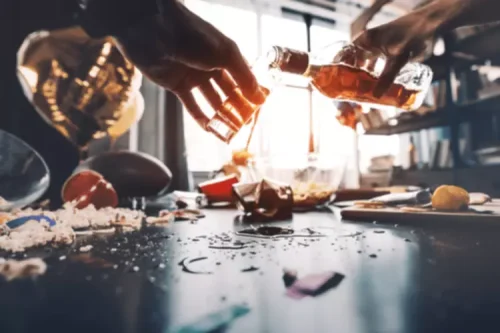Alcohol Tolerance: Chronic, Acute, Reverse, Functional

Alcohol tolerance (AT) is the key element that explains why one individual can consume large quantities of drinks with fewer negative effects while another individual feels overwhelming intoxication with small amounts of alcohol. The effects of drinking may vary from one person to the =https://ecosoberhouse.com/ other, and the history of alcohol use plays a significant role in AT. In this section, we will discuss the concept of reverse tolerance and drug sensitization as it relates to commonly abused substances, such as alcohol, cocaine, amphetamine, nicotine, marijuana, opioids, benzodiazepines, and hallucinogens. Interestingly, certain drugs, such as serotonin reuptake inhibitors, can modulate the activity of reuptake enzymes which are responsible for clearing neurotransmitters like serotonin from the synaptic cleft. This modulation can lead to an altered response to subsequent doses of the drug, potentially contributing to the development of reverse tolerance. Reverse tolerance, or sensitization, presents unique challenges in the realm of addiction and recovery.
Addiction and Dependence

Understanding how reverse tolerance works is essential for those navigating addiction or recovery, as it demands careful management to avoid potentially life-threatening outcomes. An international survey was conducted in Nadi, Fiji among people working or on holiday. Subjects were approached to complete the survey at Wailoaloa Beach, Nadi, Fiji. The survey was anonymous, and participants did not receive an incentive for completing the survey. Those who were willing to participate and understood the English language were handed the survey.
What is reverse alcohol tolerance?

Some evidence suggests that chronic marijuana use may cause desensitization of CB1 receptors, leading to reduced effects. However, others have reported experiencing an increased response to THC with prolonged exposure. More research is needed to fully understand the role of reverse tolerance in marijuana use. Repeated amphetamine exposure can heighten the effects of the drug, causing an increased response to the same dose over time. This phenomenon has been observed in both behavioral and physiological responses. Investigating reverse tolerance not only improves our understanding of how the body responds to various substances but also serves as a foundation for improving drug efficacy and safety.
Reverse Alcohol Tolerance: What It Is And How It Occurs
- Usually, one standard drink is metabolized in one hour, but people who have little or no ADH have no simple way of metabolizing the alcohol.
- This can happen due to liver or kidney damage, aging, certain medications, or health problems.
- No one should assume the information provided on Addiction Resource as authoritative and should always defer to the advice and care provided by a medical doctor.
- This phenomenon is due to a series of alterations in the brain reward system, which are common to the mechanism of action of multiple substances.
- Some writers, poets, artists, or people with different talents feel the need for booze to get them in the mood to be creative, which can result in chronic alcoholism.
The rapid elimination of alcohol from the system due to the presence of certain liver enzymes is called metabolic tolerance. The enzyme reduces the time in which alcohol effects are felt; this means that alcohol intoxication is greatly reduced in the individual. In conclusion, animal models, particularly rodents, are essential tools in addiction research. Studying the effects of various drugs on these models helps researchers understand the underlying mechanisms of drug sensitization and reverse tolerance.
- This can result in an increased response to the same dose over time and has been observed in both behavioral and physiological effects.
- In the context of drug abuse, hypersensitivity can exacerbate the severity of withdrawal symptoms, increase the risk of relapse, and contribute to the escalation of drug use over time.
- Saying that the dose response to alcohol goes down is exactly the same as saying that alcohol tolerance goes up–and vice versa.
- This can be conceptualized as a rightward shift in the dose-response curve whereby repeated exposure to alcohol is manifested in two ways.
- Reverse tolerance to THC, the main psychoactive component of marijuana, is a complex and poorly understood phenomenon.
- Eventually, such high quantities damage the liver, impeding its ability to produce the enzymes needed to break down alcohol.
- This phenomenon is one of those that end up eroding the personal lives of those who suffer from an addictive disorder, since it implies very deep economic and social losses.
By understanding these processes, researchers can better target potential interventions for individuals struggling with drug addiction. As we can see from Figure 1, tolerance in an adult who has never had a drink of alcohol in his/her life remains steady. Once a person begins to drink alcohol on a regular basis the dose response goes down–in other words the same dose of alcohol produces less intoxication than it used to. Saying that the dose response to alcohol goes down is exactly the same as saying that alcohol tolerance goes up–and vice versa. As long as a steady consumption of alcohol is maintained, tolerance will tend to increase and dose response will tend to drop. If liver damage begins to occur, however, tolerance will begin to drop once again and dose response will tend to increase.
Alcohol Tolerance
Similar to what alcoholism symptoms we think of as normal tolerance, this results in the user requiring more and more of the substance to achieve the desired effect. Acute tolerance is a process in which the brain and central nervous system (CNS) enable processes to reduce the effects of a substance immediately. Nicotine use not only produces acute tolerance but in some cases, may increase tolerance throughout the course of a day for some who smoke.
- Finally, research has shown that the sensitivity to acute alcohol effects varies with age such that, across several domains, young drinkers are less sensitive than older drinkers to alcohol intoxication effects 35.
- In most instances, the brain depends on the interplay between neurochemicals and receptors, but certain substances interrupt this process, which results in the brain becoming unable to respond.
- Support is crucial for maintaining sobriety offering motivation and resources for those seeking to reduce or eliminate alcohol intake, especially for those experiencing reverse tolerance and aiming for recovery.
- Due to chronic and excessive consumption by alcoholics, their bodies need more ethanol to produce the same effects that a new or non-frequent drinker would feel on taking standard units of alcoholic beverages.
- Reverse tolerance, or sensitization, is when the body responds more intensely to a drug or alcohol, even when lower doses are used.
- These findings run counter to our prediction that tolerance develops to the effects of alcohol hangover.
Reasons Knowing Your Drug of Choice Helps Recovery
- This phenomenon, called drug sensitization, occurs when the body becomes more sensitive to the effects of ethanol with repeated exposure, leading to an increased reaction to the same dose consumed.
- As stated above, the association between hangover frequency and age is complex, and there may be many moderating variables, which should be the subject of future research.
- Recovery in Tune offers integrated outpatient treatment programs that address substance abuse issues as well as the underlying causes of addiction and other mental health issues.
- According to a Japanese study, reverse tolerance may be related to the psychosis that sometimes occurs in people who chronically abuse amphetamines.
Other examples include hallucinogens, such as LSD, psilocybin mushrooms, Ecstasy, etc. During acute tolerance, in most cases, the effects of these substances will be mitigated by the reduction of receptor sites in the brain related to each specific substance and even possibly for particular classes of substances. Are you having persistent feelings of being swamped, sad or have sudden surges of anger or intense emotional outbursts? A simple assesment by a mental health expert could provide valuable insights into your recovery. Customised treatment plans for drug addiction, including detoxification, counselling and aftercare support.
A Guide to Alcohol Tolerance
Amphetamines are another category of drugs where reverse tolerance has been observed1. However, there is also a rare condition known as ‘reverse tolerance’ where some individuals experience the opposite effect – the body becomes increasingly sensitive to a drug over time. Well, it depends because the time required to change tolerance level varies from person to person.

3. Study 3: Naturalistic Study
Thirdly, hangover severity assessment may be biased, as this is a single measurement rather than an average over multiple drinking sessions. A single assessment may not accurately represent the typical hangover severity experienced by drinkers. Analysis of the Fiji dataset revealed similar results as the single timepoint survey and the naturalistic study.

Is AA or NA a Better Option for My Addiction Recovery?

The investigator was present to address any queries with regards to language how to build alcohol tolerance comprehension of the participants (who included international holidaymakers). According to Sacramento State University, drug sensitization may also be affected by pharmacokinetics and pharmacodynamics. In other words, different people will react differently to various types of drugs. If you or someone you love are experiencing drug abuse and tolerance, please seek help immediately before the condition worsens. Addiction is a lifelong disease, but, fortunately, it can be effectively treated. Individuals who suffer need evidence-based, professional help in the form of behavioral therapy and counseling.